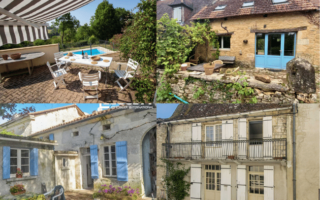Count the costs: French mortgages

If you are thinking of taking out a French mortgage to fund your dream move to France, read Sharon Hill’s guide to the associated costs of borrowing across the Channel
Mortgages in France are readily available to foreign purchasers, and with attractively low interest rates, an increasing number of buyers are taking out a French mortgage, keeping their savings for other projects such as renovations.
As with any financial transaction, borrowers have to understand the costs involved so that they can truly compare the options available in order to make an informed decision before committing. France has taken steps in recent years to facilitate this process, and in 2013 it created a unique register for all mortgage intermediaries with the ORIAS (French equivalent of the FSA) and new stricter guidelines for intermediaries to follow.
Any person or company offering financial services relating to loans or mortgages in France must be registered with the ORIAS in one of four categories. Only registered brokers can provide quotations and handle mortgage applications, and these brokers have to respect certain conditions regarding the information they supply.
Compare the market
It is compulsory for mortgage brokers and banks to quote the TEG when providing mortgage and loan quotations to consumers or when advertising. TEG stands for Taux Effectif Global and is the equivalent of the APR in the UK.
It is an indicative way of comparing different mortgages and is different to the nominal rate of interest, which is commonly referred to as the interest rate. The interest rate is the basic rate of interest applied to the capital borrowed, whereas the TEG allows borrowers to compare different mortgages with the associated costs included.
The costs included in the TEG are mortgage broker fees, lenders’ arrangement fees, mortgage guarantee/mortgage registration fees and life insurance. These all have to be included and the TEG is calculated by adding all of these costs to the overall cost of borrowing, as well as the cost of the nominal interest and then reverse calculating the global cost interest rate.
When looking at mortgages, few people think to compare associated costs and yet these can vary greatly, so this is a helpful way of assisting borrowers in the decision making process; so long as one understands that the interest rate and TEG are two different things.
Here is a guide to the costs that need to be included.
Mortgage broker fees
When a mortgage broker charges a broker fee to the borrower, this must be communicated to the bank and included in the TEG in the mortgage offer. This fee must also be included in the TEG given in the quotation by the broker to their client.
It is strictly forbidden for a broker to charge any kind of upfront broker fee or administration charge in accordance with the French Consumer Code Art L321-2.
This law clearly forbids finance professionals from requesting any form of money from a private person until mortgages or loans have been obtained.
Lender arrangement fees
When a mortgage lender or bank agrees a mortgage, there will almost always be some form of arrangement fees called frais de dossier in French. These must be communicated upfront and included in all quotations and in the calculation of the TEG.
Arrangement fees can vary from a few hundred euros to 1% of the loan depending on the bank or lender. Frequently, a mortgage broker will negotiate these on behalf of the borrower, or a cap on the overall amount may be applied by the lender in order for them to remain competitive.
The arrangement fees cover all the administrative aspects of the setting up of a mortgage. With banks that require a valuation of the property, the cost associated with this is also included. Generally speaking, banks that have specific structures in place to deal with non-resident mortgages tend to have more expensive arrangement fees as these fees go towards covering the part of the cost of specialist services provided by these structures.
Just like broker fees, the arrangement fees cannot be requested upfront and are only payable if the mortgage concludes. They are normally debited from the borrower’s French bank account the month following the completion of the mortgage.
Life insurance
Consumer protection is a very important aspect of life in France, and banks consider that it is irresponsible for someone to take out any form of borrowing without being insured.
Even people taking out personal loans have insurance, which is very different to the UK where most people don’t, and there has been much negative press due to the misselling of payment protection insurance.
In France, however, lenders have a legal obligation to lend responsibly so they must ensure that they have taken all necessary steps to ensure that the mortgage is affordable to the borrower, and advising on appropriate insurance coverage is part of this.
So, while it’s not legally compulsory, the majority of French banks will make it clear that they will not lend unless the borrower is insured for the mortgage amount and duration, and the cost of this must be included in the TEG and in the mortgage offer.
Frequently, the best interest rates can be obtained by taking the lender’s group insurance policy, as the lender is guaranteed that the insurance will be paid throughout the duration as it is debited at the same time as the mortgage payment, thus offering greater security that the borrower is correctly covered.
However, in some cases, French lenders will also accept existing insurance policies or policies through external insurance companies which can offer the borrower savings, for example, if the borrower is very young or practices a profession which is considered as high risk.
There is an agreement called AERAS in France which allows everyone to be insured, even if they have an illness or are excluded by the mainstream insurers. The AERAS convention will allow borrowers to obtain insurance and in some cases (for French residents only), part of the insurance premium may be subsidised depending on the borrower’s income.
The overall cost of the insurance if the loan runs for the full term is always included in the calculation of the TEG.
Frais de garantie
Also known as frais d’hypothèque, mortgage registration fees are associated with the legal guarantee that the notaire will register on behalf of the mortgage lender or bank.
The estimation for this cost has to be included in the mortgage offer, but it is debatable whether it really can be included in the calculation of the TEG as it is not a set cost and is defined by the notaire. Nonetheless, an estimation must be given.
French mortgages are registered for the most part via a notaire. The mortgage deed is a notarised deed which is then registered with the national mortgage register (conservation des hypothèques) and the cost related to this is often referred to as a registration tax.
The lenders register their first charge on the property via the notaire and mortgage deed and they take out a guarantee on the property. There are two main types of legal guarantee available to non-French residents: a hypothèque and an IPPD (Inscription en Privilège de Prêteur de Deniers) guarantee.
For those living and working in France there is also the possibility of a mutualist guarantee which can be considerably cheaper, but because the guarantee has to be approved by their underwriters it is not possible to provide this type of guarantee for borrowers not residing in France.
Both hypothèques and IPPDs need to be registered via the notaire and there is a cost related to registering these. Furthermore, when the mortgage is paid off and the legal charge needs to be removed there is a further charge for doing so. Overall, an IPPD is less expensive than a hypothèque.
IPPD guarantees are not available on new-build or inhabitable renovation projects; they can only be registered on existing properties. It is the bank that will decide on the type of guarantee that they will take and this information will be communicated within the mortgage offer.
Frais de sociétaire
Some banks in France are mutualiste which means their customers are shareholders as opposed to the bank being privately owned or quoted on the stock exchange.
When a borrower takes out a mortgage with one of these banks, they are frequently buying into the bank at the same time, and thus part of the arrangement fees may be broken down into frais de sociétaire. These aren’t considered to be fees by the lender for the sake of the TEG as you can get a return on them, and you can get your money back on them if you sell them. For the sake of transparency, however, they are a cost associated with the mortgage and should therefore be included in the fees.
Other costs
All of the above costs are associated directly with taking out a French mortgage and are therefore included in the TEG.
However, it is important to keep in mind that there are other costs to pay when buying French property, such as estate agent fees, notaire fees (typically 7-8% of the sale price), home insurance and bank account fees.
Banks in France charge for banking, unlike in the UK, so it is important to consider the costs of the bank account and associated services such as a Visa card or internet banking.
Sharon Hill is owner of French Mortgage Direct
Tel: 0800 530 0673
Share to: Facebook Twitter LinkedIn Email


